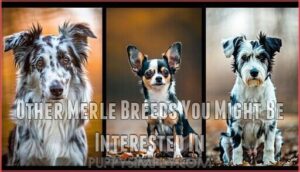This site is supported by our readers. We may earn a commission, at no cost to you, if you purchase through links.

This stunning blend of a Bernese Mountain Dog and a Poodle combines loyalty, smarts, and a playful spirit.
The merle pattern comes from specific genetics, creating unique swirls of color that make no two dogs the same.
They’re affectionate, family-friendly, and love being the center of attention—think of them as a walking cuddle with a touch of glamour.
But with great looks comes great responsibility, especially when finding a reputable breeder.
Want to know why merle coats fade or how to spot a reputable breeder? Keep reading!
Table Of Contents
- Key Takeaways
- What is a Merle Bernedoodle?
- Merle Bernedoodle Genetics
- Merle Bernedoodle Temperament
- Other Merle Breeds You Might Be Interested In
- Finding a Reputable Merle Bernedoodle Breeder
- Merle Bernedoodle Names
- Are Merle Bernedoodles Rare?
- Do Merle Bernedoodles Fade?
- Double Merle Bernedoodle
- Responsible Breeding Practices
- Frequently Asked Questions (FAQs)
- Do merle Bernedoodles have health issues?
- How much do merle Bernedoodles cost?
- What is the most desirable Bernedoodle color?
- How much do Merle Bernedoodles cost?
- What colors are available in a Merle Bernedoodle?
- Are Merle Bernedoodles hypoallergenic?
- What are the health risks associated with Merle Bernedoodles?
- What is the life expectancy of a Merle Bernedoodle?
- What are common health issues in Merle Bernedoodles?
- How to determine a Merle Bernedoodle’s exercise needs?
- Conclusion
Key Takeaways
- A Merle Bernedoodle’s unique, marbled coat and charming personality make them a head-turner and great family companion.
- Responsible breeding is essential to avoid health issues like vision or hearing problems, especially from double merles.
- These hypoallergenic, low-shedding dogs thrive on attention, moderate exercise, and positive reinforcement training.
- Prices range from $3,000 to $6,000 due to their rarity and stunning coats, so choose reputable breeders to ensure a healthy pup.
What is a Merle Bernedoodle?
A Merle Bernedoodle is like a walking work of art, thanks to its striking coat and infectious personality.
A Merle Bernedoodle brings vibrant artistry to life, combining a stunning coat with an irresistibly charming personality.
This unique mix of a Bernese Mountain Dog and a Poodle is defined by its genetic coat pattern, created by the merle gene.
The result? A mesmerizing blend of colors, like bluish-grey, chocolate, or red, speckled or patched with black or dark brown.
Some popular coat patterns include Tri-color Merle and Phantom Merle.
Merle Bernedoodles aren’t just about looks—they’re total charmers.
Irresistible charm meets stunning beauty—Merle Bernedoodles captivate hearts with their playful spirit and mesmerizing, marbled coats.
Their hypoallergenic coats and pleasant temperament make them perfect companions for families.
Breed origins play a role in their intelligence and loyalty, but responsible breeding is key to avoiding Double Merle puppies, which can lead to health issues.
At $3,000–$5,000 each, they’re an investment, but their enchanting appearance and lovable nature make them undeniably worth it.
Who wouldn’t fall for those dreamy blue eyes?
Merle Bernedoodle Genetics
Ever wonder what makes a Merle Bernedoodle’s coat so mesmerizing? It’s all thanks to the Merle allele—a dominant gene responsible for an intricate genetic coat pattern featuring unique speckles and patches. This effect, known as coat dilution, transforms the base color into lighter shades, creating the stunning, marbled look Merle enthusiasts adore.
Merle Bernedoodles aren’t purebred; the gene introduction stems from breeds like Australian Shepherds or Collies.
Key points about their genetics include:
- F1 pairings involve crossing a Merle Poodle with a Bernese Mountain Dog for consistent traits.
- Cryptic merle dogs may carry the Merle gene but lack visible patterns, complicating breeding.
- Dog genetics tests are essential to prevent double Merles, which risk severe health issues.
- Health concerns include vision/hearing impairments from improper pairings.
Smart, ethical breeding guarantees healthier, happier pups!
Merle Bernedoodle Temperament
These pups are much more than their striking coats—they’re intelligent, loyal, and packed with personality.
Known for their gentle spirit and affection, Merle Bernedoodles make excellent family companions.
They’re keen to please, making training a breeze with consistency and positive reinforcement.
With moderate energy levels and strong social needs, they thrive with ideal owners who enjoy time outdoors and bonding.
Their playful nature pairs beautifully with their affectionate side, creating a bernedoodle temperament that guarantees these dogs are lovable additions to any home, thanks to their lovable characteristics.
Other Merle Breeds You Might Be Interested In
If Merle Bernedoodles have caught your eye, you’ll be glad to know there are plenty of other stunning merle breeds worth exploring.
From lively Australian Shepherds to charming Merle Chihuahuas, each breed offers its own unique personality and eye-catching coat patterns, making them a fascinating group to discover and learn about breeds.
Merle Australian Shepherds
Australian Shepherds, or Aussies, flaunt stunning Merle coat variations thanks to the Merle allele.
Known for their intelligence and energetic Aussie temperament, they’re a favorite among active families.
However, proper Merle breeding ethics matter, as poorly managed pairings risk ocular and auditory defects.
Exploring Aussie Merle genetics guarantees healthier, dazzling companions without the Merle health issues found in irresponsible breeding.
Merle Chihuahuas
These tiny pups bring big charm, especially with their dazzling Merle coat variations, featuring reds, copper, beige, and white speckled with darker shades.
Their bold personalities make up for their size, but Merle Chihuahua genetics often mean extra care is needed.
- Health concerns: Ocular and auditory issues are common risks.
- Breeding ethics: Avoid breeding two Merles; it prevents genetic complications tied to the notorious Merle gene in this adored dog breed.
Merle Corgi
With their charming patchwork coats, Merle Corgis are a mesmerizing blend of playful personality and striking beauty.
These lively dogs boast unique Corgi coat variations, from speckles of red and beige to dark brown or black.
However, Corgi Merle genetics bring risks, including Double Merle complications, so careful breeding is key.
| Feature | Merle Corgi Details |
|---|---|
| Coat Patterns | Red, beige, black, dark brown |
| Health Concerns | Skin cancer, deafness, blindness |
| Breeding Focus | Avoid Double Merles |
Choose wisely and enjoy this delightful companion, considering the importance of careful breeding and being aware of potential health concerns.
Merle English Bulldog
Merle English Bulldogs stand out with their stunning, marbled coats and unique eye colors like amber or green.
Thanks to Merle Color Genetics, their patterns are breathtaking, but breeders need to prioritize health to avoid Bulldog Health Concerns like auditory or vision issues caused by poor breeding practices.
Their lovable Bulldog Temperament makes them fantastic companions, though their grooming needs demand regular attention.
If you’re captivated by this merle dog breed, guarantee responsible breeding to prioritize their well-being and avoid issues related to poor breeding practices.
Merle French Bulldogs
With their eye-catching merle coat colors blending red, copper, and beige, Merle French Bulldogs are a true showstopper.
The merle pattern, caused by the Merle gene, creates lightened sections in their coats, often paired with mesmerizing amber or green eyes.
However, Merle health issues are a concern, especially with double merles, which face severe hearing and vision impairments.
Careful breeding considerations are key to avoiding these risks, and while the Merle popularity grows, always prioritize French Bulldog genetics over trends when choosing this merle dog breed responsibly.
Merle Mastiffs
If you’ve ever seen a Mastiff with a mesmerizing merle pattern, you know they bring a unique twist to a classic breed.
Merle Mastiff genetics create stunning coat variations, including red, copper, and beige, that truly turn heads.
But beauty comes with a price—merle health concerns like hip dysplasia, vision issues, or rare green eyes can arise.
Responsible Mastiff breeding is vital to avoid dog health issues, especially by steering clear of double-merle pairings, which is crucial for their big size and bigger needs.
Treat them well, and they’ll repay with love.
Merle Pit Bulls
If you’re captivated by rare patterns, Merle Pit Bulls are a head-turner with their striking coat colors.
However, their history isn’t without challenges. Unlike recognized breeds, Merle Pit Bulls often face breed standard issues because the merle gene isn’t naturally part of their genetics.
This gene is introduced through other breeds, which can sometimes lead to health concerns like deafness or vision problems.
When considering adding one to your family, finding reputable breeders is key. Always ask about parental DNA tests, specifically regarding color genetics, to guarantee responsible breeding.
Vets often recommend avoiding “double merle” pairings due to serious health risks. If health, beauty, and uniqueness are your priorities, make sure to prioritize safety over stunning coat colors.
Merle Pomeranian
The enchanting Merle Pomeranian is a pint-sized pooch with dazzling coat color variations, thanks to unique Pomeranian Merle Genetics.
Their playful temperament charms everyone, but be mindful of potential Merle health concerns, like hearing or vision issues.
Selecting a reputable breeder guarantees safe practices and avoids risky breeding ethics, always ask about the Merle gene and seek transparency.
These little fluffballs may be small, but their personalities are larger than life!
Merle Poodles
Merle Poodles stand out with their eye-catching, swirling coat patterns, thanks to unique Merle coat genetics. While not meeting the traditional Poodle breed standard, these pups bring a dazzling touch of color to the breed.
- Originates from mixing breeds with the Merle gene.
- Health concerns include risks from Merle-to-Merle breeding.
- Offers unique shades like blue Merle or Phantom Merle Bernedoodle.
Always prioritize reputable breeders!
Merle Pugs
If you’ve spotted a Merle Pug, you know how striking their marbled coats can be.
Thanks to the Merle gene, these tiny dogs stand out, but they come with baggage.
Double Merles face serious health issues like vision problems and skin sensitivities.
Breeding responsibly is vital for these beauties.
Pug Genetics also means regular grooming is essential to maintain their adorable, wrinkled features.
Their playful Pug Temperament makes them lovable companions when bred with health in mind.
Finding a Reputable Merle Bernedoodle Breeder
Finding a reputable Merle Bernedoodle breeder doesn’t have to feel like searching for a needle in a haystack.
You just need to know what questions to ask and what red flags to avoid to guarantee you’re working with someone who prioritizes health and ethics.
Meeting The Breeder
When meeting a Bernedoodle breeder, ask plenty of questions about their breeding practices and look for a well-maintained facility.
Check for health guarantees on puppies and observe how parent dogs interact—you’ll pick up clues about temperament. A solid socialization process shows ethical breeding.
Consider researching Bernedoodle breeder products to guarantee proper care. Can’t visit? Arrange a virtual tour. A responsible breeder always welcomes inquiries.
Red Flags to Watch For
When choosing a breeder, pay close attention to their honesty and transparency. If they won’t let you visit or meet the parent dogs, it’s a red flag—this might indicate poor conditions or even a puppy mill.
Always ask for health guarantees and proof of genetic testing, especially to avoid double merles, which come with serious dog health risks like blindness or deafness. Unusually low prices often signal breeder dishonesty, while shockingly high pricing might be more about profit than ethics.
Responsible dog breeding focuses on healthy puppies, not financial gain. Trust your gut—if something feels off, it probably is. An F1b Bernedoodle, known for its hypoallergenic traits, deserves careful breeding to match their unique charm without risking their health or welfare.
A merle Bernedoodle deserves careful breeding to match their unique charm without risking their health or welfare, emphasizing the need for careful breeding and consideration of the dog’s unique charm and potential health risks.
Merle Bernedoodle Names
Naming your Merle Bernedoodle is exciting, but where do you start? Let your pup’s merle pattern inspire you with these fun ideas:
- Unique Merle Names – Think "Marble," "Speckles," or "Dapple."
- Color-Inspired Names – Try "Azure" for blue merles or "Cocoa" for red merles.
- Personality-Based Names – A playful pup may suit "Zippy," while a gentle one fits "Willow."
- Gender-Specific Names – Go for "Luna" or "Max."
- Popular Bernedoodle Names – Consider classics like "Bailey" or "Charlie."
Remember that the merle gene dilutes colors, creating unique coat patterns. Find the perfect fit!
Are Merle Bernedoodles Rare?
Merle Bernedoodles are rare gems, prized for their breathtaking merle patterns and enchanting coat variations.
Their rarity stems from the careful balance required in breeding—avoiding Double Merles while maintaining the stunning Merle gene.
Geographic distribution and high breeding demand add to their exclusivity, with prices ranging from $3,000 to $5,000.
It’s not just their unique looks but the painstaking effort behind responsible breeding that makes them special, radiating charm and beauty.
Owning one means embracing a rare breed that embodies these qualities.
Do Merle Bernedoodles Fade?
Merle Bernedoodles sometimes fade as they age, thanks to the "fading gene" inherited from their Poodle parent. This dilution gene can gradually lighten their stunning coats, which might surprise you if you’re not expecting it!
Color intensity often changes during their first two years, making their coat look different from puppyhood. Some breeders specialize in merle variations, such as the blue merle Aussiedoodle.
- Solid vs. Merle: Solids tend to fade more noticeably than Merles.
- Coat Colors: Blues, reds, and chocolates may soften over time.
- Aging Effect: Fading is natural, giving your pup a unique, evolving appearance, due to the aging effect and the fading gene, resulting in a unique appearance.
Double Merle Bernedoodle
Double Merle Bernedoodles might look unique, but their health issues are no joke.
Breeding two merle dogs can result in severe ocular defects, auditory defects, or even skin cancer.
Ethical concerns arise when breeders neglect genetic testing, increasing the risk of these issues.
Sadly, puppy mills often prioritize profit over proper breeding.
Responsible breeding avoids these consequences altogether by ensuring only one parent carries the merle gene.
Your Merle Bernedoodle deserves a healthy start—stick with breeders who prioritize their well-being!
These breeders understand the importance of genetic mutation and outcrossing to minimize health risks.
Responsible Breeding Practices
In the context of responsible breeding practices for Merle Bernedoodles, genetic testing and DNA tests are a must.
Ethical considerations mean avoiding double-Merles to prevent severe health issues like blindness or deafness.
Make sure your breeder prioritizes health screenings and has educated themselves thoroughly on dog breeding ethics and dog genetics testing.
Look for breeding practices that emphasize proper pairing—a Merle with a non-Merle—to guarantee healthy pups.
Remember, responsible breeding isn’t just about appearances; it’s about creating happy, healthy companions!
Breeders should understand the Merle gene’s complexity to minimize potential health risks in offspring.
Frequently Asked Questions (FAQs)
Do merle Bernedoodles have health issues?
Think of genetics as a game of cards—merle Bernedoodles can draw some tricky ones.
They’re healthy when responsibly bred, but doubling the merle gene risks hearing, vision issues, or skin sensitivities.
Always choose reputable breeders.
How much do merle Bernedoodles cost?
Prices for Merle Bernedoodles typically range from $3,000 to $6,000, depending on coat pattern, breeder reputation, and location.
While they’re an investment, you’re getting a loving, loyal companion with a one-of-a-kind, stunning look!
What is the most desirable Bernedoodle color?
You might think all Bernedoodle colors are equally stunning, but tri-color takes the crown.
Its black, white, and tan combination resembles a classic Bernese Mountain Dog, making it a top favorite for its striking resemblance and charm.
How much do Merle Bernedoodles cost?
Merle Bernedoodles usually cost between $4,000 to $6,000, depending on their coat pattern, generation, and breeder reputation.
Their rarity and unique coloring make them a pricier pick, but many owners say they’re worth every penny!
What colors are available in a Merle Bernedoodle?
You’ll find Merle Bernedoodles in stunning colors like blue merle, red merle, phantom merle, and tri merle.
Each coat blends unique shades like gray, black, white, or brown, creating eye-catching, speckled patterns.
Are Merle Bernedoodles hypoallergenic?
Did you know about 10% of dog owners seek hypoallergenic breeds?
While Merle Bernedoodles are low-shedding and recommended for allergy sufferers, individual reactions vary—spend time with one first to see if they’re pet-perfect!
What are the health risks associated with Merle Bernedoodles?
Breeding challenges aside, health risks include vision issues, deafness, and skin sensitivities linked to merle genes.
Responsible breeding, like avoiding double merles, helps minimize these concerns, keeping your Bernedoodle bouncing happily through life with responsible breeding practices!
What is the life expectancy of a Merle Bernedoodle?
Life’s a journey, and for a Merle Bernedoodle, it often spans 12–15 joyful years.
With proper care, exercise, and love, your furry friend will stick by your side for a long, wag-filled adventure!
What are common health issues in Merle Bernedoodles?
Merle Bernedoodles can face vision and hearing issues, especially from improper breeding.
They’re prone to hip dysplasia, progressive retinal atrophy, and skin sensitivities.
Regular check-ups, responsible breeding, and proper care greatly reduce these health risks.
How to determine a Merle Bernedoodle’s exercise needs?
To figure out your Merle Bernedoodle’s exercise needs, consider their energy level and age.
Typically, they thrive with 30-60 minutes of daily activity, like walks, playtime, or mental stimulation.
A tired pup’s a happy pup!
Conclusion
A Merle Bernedoodle is like a living work of art, with a personality as vibrant as its swirled coat.
These loyal, playful pups are perfect for families who value affection and individuality.
With the right breeder, you’ll find a healthy companion who truly stands out.
Remember, responsible breeding guarantees their unique beauty doesn’t come at a cost.
Ready to bring home a merle masterpiece? Do your homework, and your new best friend could soon be by your side, with a companion that is a true work of art!
- https://littlepuppypaws.com/puppies/
- https://berrypatchpuppies.com/merle-bernedoodle/
- https://www.wisconsindesignerdoodles.com/what-is-a-tri-parti-red-merle-bernedoodle?srsltid=AfmBOooL8NQkyUmCxpp0u0ylmByOSgVWbsv7ckrjH8u15GoAI_KXJbh6
- https://wtbernedoodles.com/the-merle-pattern-in-bernedoodles/
- https://centralillinoisdoodles.com/blog/merle-bernedoodles/














